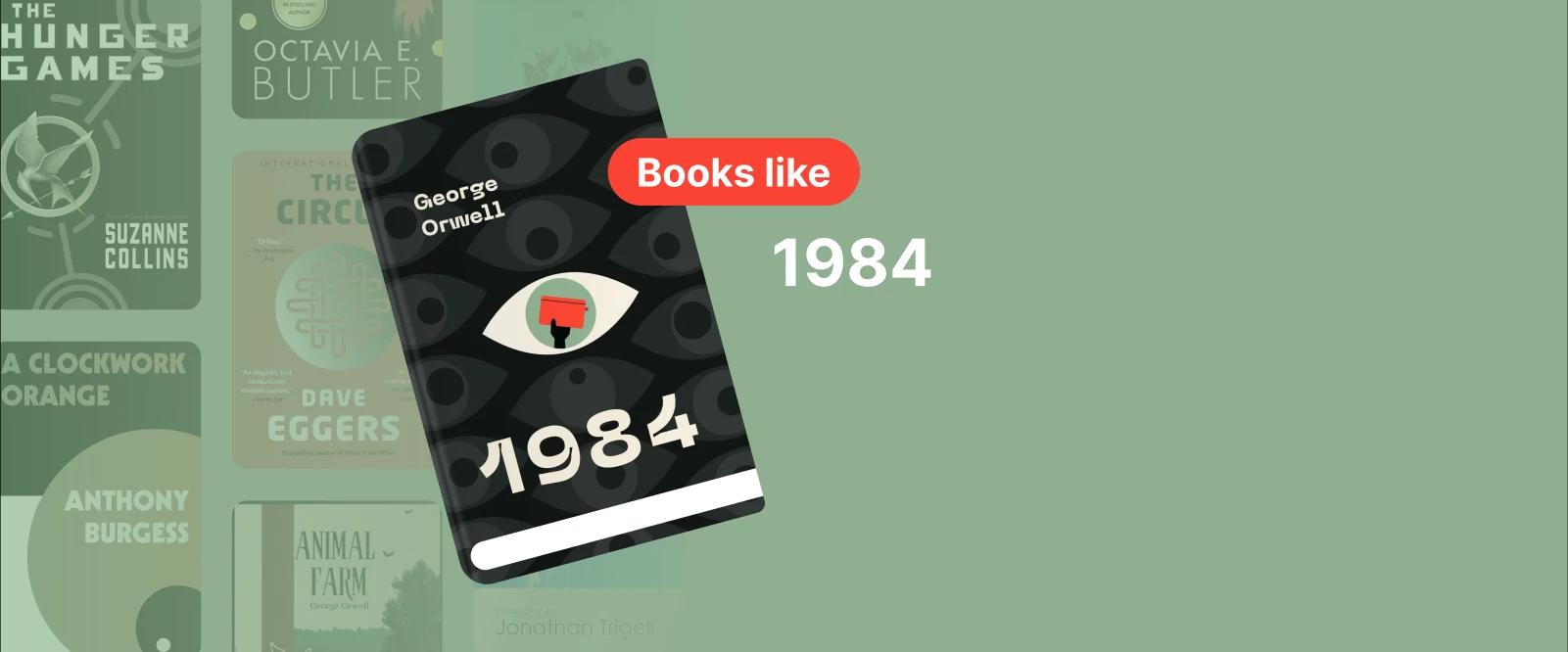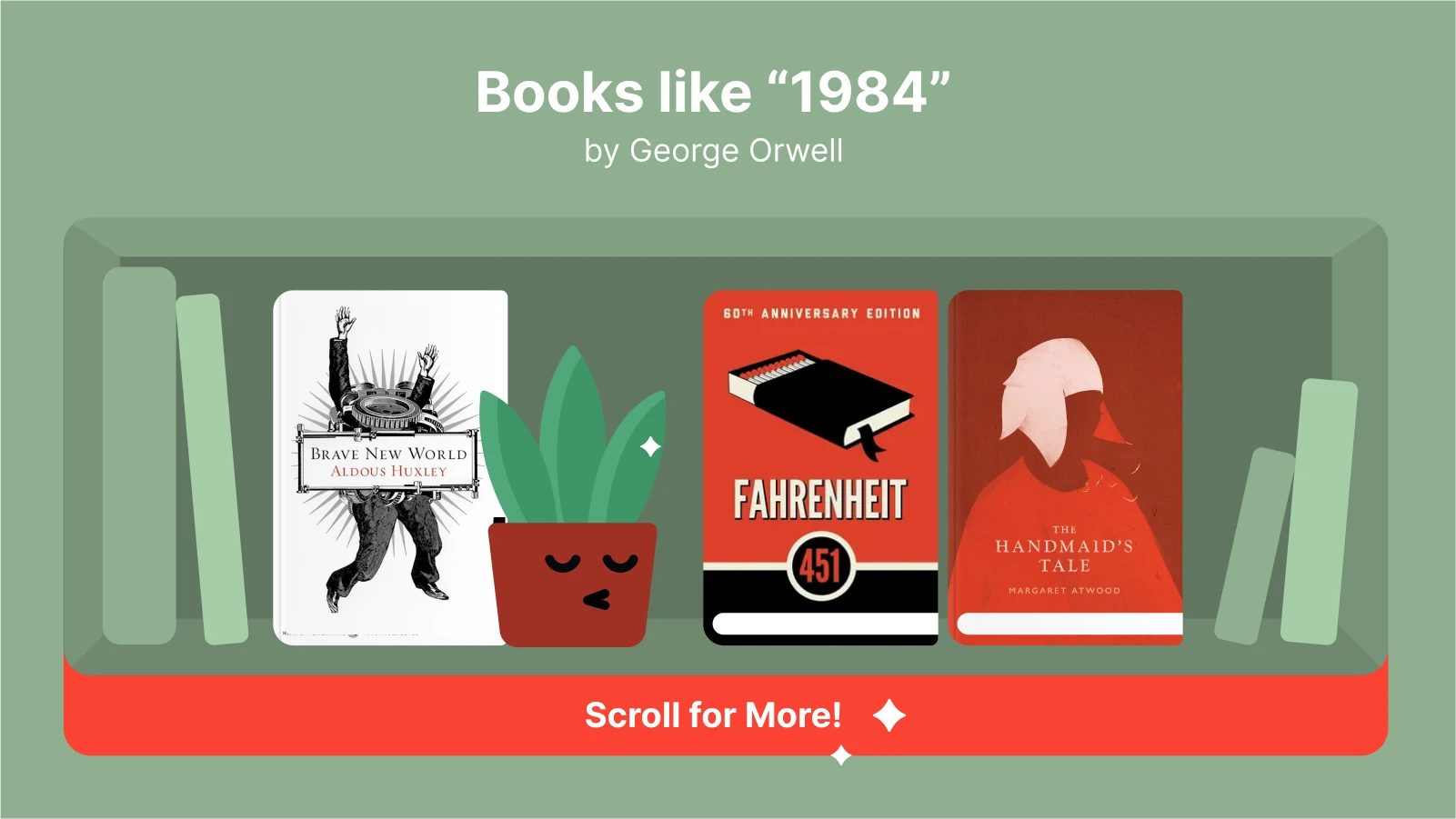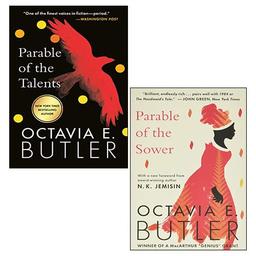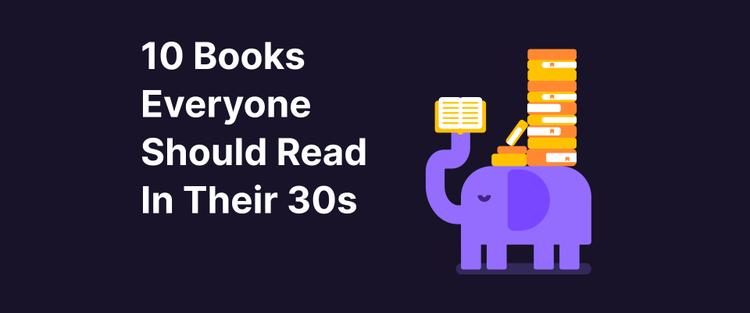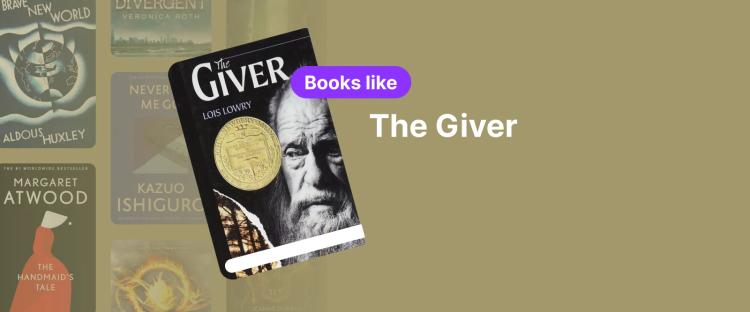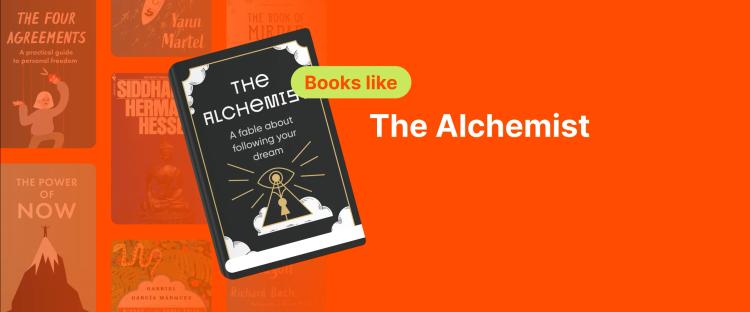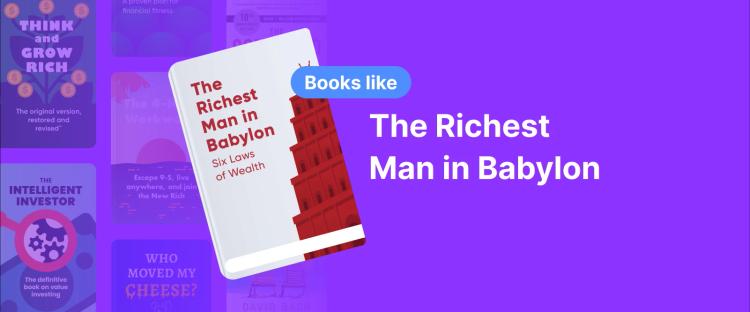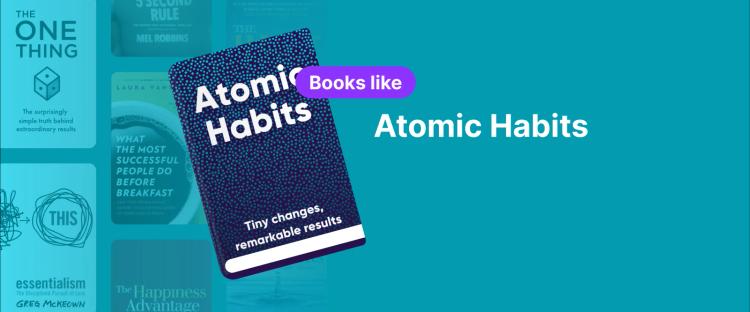This article shares classic and modern dystopian novels that echo '1984'. Each book adds something new to the conversation Orwell started. Ready to explore? Let's dive into more stories about dystopia and hope.
Want to explore these dystopian worlds but don't have time to read 16 full books like '1984'? The Headway app turns these powerful novels into 15-minute summaries. You'll grasp the big ideas, understand the warnings, and discover which books deserve your full attention.
Start using Headway and experience '1984' and other dystopian classics in bite-sized pieces that fit your busy life.
Quick Answer: What are the top 5 books like '1984'?
'Brave New World' by Aldous Huxley — A society controlled by pleasure and genetic engineering, where nobody questions anything.
'Fahrenheit 451' by Ray Bradbury — Books are illegal and firemen burn them, until one fireman starts asking why.
'The Handmaid's Tale' by Margaret Atwood — Women lose all rights in Gilead, forced into roles they never chose.
'Animal Farm' by George Orwell — Farm animals overthrow humans only to become just as corrupt with power.
'The Hunger Games' by Suzanne Collins — Kids fight to the death on TV while the Capitol watches for entertainment.
16 books to read if you liked '1984'
More than 30 million people have read '1984'. If you're one of them and want more, you're in the right place. These are the best books that share Orwell's dark vision. They're not just stories — they're warnings about what could happen if we're not careful.
Get ready for some of the most thought-provoking dystopian literature you'll ever read. Many of these are perfect for high school readers and beyond. You can find most on Amazon or at your local library. Or, you can download apps like Headway to have your favourite books always with you!
📘 Can't carry 16+ dystopian novels? Get Headway for powerful summaries that warn and inspire!
1. 'Brave New World' by Aldous Huxley
Remember when your parents said too much TV would rot your brain? Aldous Huxley took that idea and ran with it. His world doesn't need Big Brother watching — everyone's too high on soma to care. People are literally grown in bottles and sorted like Amazon packages into social classes. Nobody questions anything because, honestly, why would you when you're having such a good time?
Similarities with '1984':
Society controls everything.
No real freedom exists.
Technology keeps people in line.
The government decides what's true.
2. 'Fahrenheit 451' by Ray Bradbury
Picture this: firefighters who start fires instead of stopping them. That's Ray Bradbury's twisted vision, where Guy Montag works as a fireman burning books because reading is illegal. Think about that next time you complain about your job. This classic asks what happens when people stop reading and start staring at screens.
Similarities with '1984':
Government censorship rules everything.
History gets erased.
Constant surveillance.
Fear keeps people quiet.
3. 'The Handmaid's Tale' by Margaret Atwood
Ever had a bad day and thought, "Well, at least I still have human rights"? Margaret Atwood imagined what happens when that's not true anymore. Gilead rises from America's ashes, and suddenly, women are walking wombs in red dresses. The story hits different when you realize Atwood based every single horror on something that actually happened somewhere in history. That's what makes it truly harrowing.
Similarities with '1984':
Totalitarian surveillance everywhere.
Language gets twisted for control.
Public executions scare everyone.
People still try to resist.
📘 Chilled by Gilead? Get Headway for dystopian warnings from visionary authors!
4. 'The Hunger Games' by Suzanne Collins
Reality TV meets gladiator fights — what could go wrong? Suzanne Collins answers that question with kids killing each other for entertainment while the rest of us... Well, while the Capitol watches.
Before you judge, remember how many people watched the 'Squid Game'. Katniss didn't sign up to be a revolutionary icon, but here we are.
Similarities with '1984':
The government watches everything.
Symbols of rebellion emerge.
Violence becomes entertainment.
Propaganda controls the message.
5. 'A Clockwork Orange' by Anthony Burgess
The author of this book asks the ultimate question: if someone literally can't choose evil, are they really good? Alex loves ultra-violence until the government "cures" him. Then he can't even defend himself.
'A Clockwork Orange' makes you think twice about wishing people would just behave.
Similarities with '1984':
The government controls minds.
Youth rebellion gets crushed.
Suffering breaks people down.
Language becomes a tool of control.
6. 'The Circle' by Dave Eggers
minutes ago? Dave Eggers wrote a whole book about where that leads. Mae thinks she landed her dream job at The Circle — it's like working at Google, Facebook, and Amazon combined! The American dream has become a reality. Except that "sharing is caring" becomes mandatory, and privacy becomes selfish.
Similarities with '1984':
Total surveillance.
No privacy anywhere.
Forced conformity.
One entity controls everything.
7. 'Parable of the Sower' and 'Parable of the Talents' by Octavia E. Butler
What if climate change actually happened and nobody did anything? Oh wait... Octavia E. Butler saw this coming in 1993. America is burning, water costs more than gas, and Lauren literally feels other people's pain. Like, physically feels it.
She starts a new religion because when everything falls apart, people need something to believe in. So Butler didn't write a dystopian future — she wrote what we hear in the news every day now.
Similarities with '1984':
Strong resistance against power.
The government watches everyone.
Religion becomes control.
Society falls apart.
📘 Seeing our future in Butler's vision? Try Headway for prophetic insights from sci-fi visionaries!
8. 'Animal Farm' by George Orwell
Before '1984', Orwell practiced with pigs. No, really — 'Animal Farm' uses barnyard animals to explain the Russian Revolution. "All animals are equal, but some animals are more equal than others." If that doesn't sum up every group project you've ever done, we don't know what does. The animals kick out the farmer, only to become exactly like him. It's almost like power corrupts or [choose what's going on in your county].
Similarities with '1984':
Shows how totalitarian systems work.
Propaganda tricks everyone.
Good ideas get twisted.
Oppression returns.
9. 'Lord of the Flies' by William Golding
Remember thinking grown-ups were the worst when you were a kid? If so, this book is definitely for you. William Golding wrote about kids becoming literal savages on an island. No adults, no rules, just murderous vibes. A conch shell becomes government, face paint becomes war paint, and Piggy.
Well, let's just say glasses aren't great for survival. Every teacher assigns this to prove that humans are terrible. They might have a point.
Similarities with '1984':
Explores human nature's dark side.
Power corrupts quickly.
Individual identity disappears.
Groups become violent.
10. 'This Perfect Day' by Ira Levin
"Thank Uni for this perfect day!" If that sounds creepy, wait till you hear about the near future where a computer UniComp decides everything for you. What to eat, who to marry, when to die — all sorted!
Ira Levin wrote this before we had Alexa listening to everything, which makes it extra unsettling. Chip (yes, that's really his name) starts wondering why perfect feels so wrong.
Similarities with '1984':
One power controls all.
People question reality.
Truth gets manipulated.
11. 'The Dispossessed' by Ursula K. Le Guin
Two planets, two systems, zero winners. Ursula K. Le Guin sends physicist Shevek bouncing between an anarchist moon and a capitalist planet. Surprise, surprise — both kinds of suck, and Le Guin asks: Can any society be perfect, or are we all just different flavors of messed up?
Similarities with '1984':
Society limits personal freedom.
Characters struggle with restrictions.
Questions what utopia means.
12. 'The Giver' by Lois Lowry
Imagine a world with no pain, no war, and no color. Sounds nice? Lois Lowry says Think again. Jonas gets chosen for the worst job ever: remembering all the stuff everyone else forgot. Turns out, when you remove pain, you also remove joy. When you stop war, you also stop love. Middle school teachers love assigning this book because it makes kids appreciate their colorful and painful lives.
Similarities with '1984':
The past gets erased completely.
Forbidden knowledge changes everything.
One person challenges the system.
📘 Grateful for feeling everything? Get Headway for life lessons from award-winning authors!
13. 'V for Vendetta' by Alan Moore and David Lloyd
resistance against totalitarian rule.
V blows things up and quotes Shakespeare. It's dramatic and compelling at the same time. The story hits different when you realize how many real protesters now wear V's mask. Sometimes fiction becomes an instruction manual.
Similarities with '1984':
Totalitarian government rules.
Surveillance everywhere.
No personal freedom.
Propaganda controls minds.
14. 'Blindness' by Jose Saramago
One person goes blind. Then another. Then everyone. Jose Saramago doesn't even name his characters because when society collapses, names don't matter. What matters is who has food and who becomes a monster when nobody's watching. Except everyone IS watching, they just can't see. It's the most disturbing game of Marco Polo ever written.
Similarities with '1984':
Society breaks down fast.
Freedom disappears.
Humanity gets tested.
Power shifts dangerously.
15. 'The Iron Heel' by Jack London
Before Orwell, before Huxley, Jack London saw it coming. The ultra-rich crush everyone else under their Iron Heel (subtle, right?). This was written in 1908, but London predicted fascism, corporate control, and class warfare. The scariest part is he was early, not wrong.
Similarities with '1984':
The elite class oppresses everyone.
Resistance keeps fighting.
Power becomes dangerous.
Rebels become symbols.
16. 'Never Let Me Go' by Kazuo Ishiguro
What if you found out your life had an expiration date? Kazuo Ishiguro writes about kids at a weird boarding school in England who slowly realize they're spare parts.
'Never Let Me Go' unfolds like peeling an onion — each layer makes you cry harder. These kids accept their fate so calmly that it makes you want to scream at the pages.
Similarities with '1984':
System controls destiny.
Truth stays hidden.
Hope feels impossible.
Sacrifices seem normal.
📘 Heartbroken but hooked? Try Headway for emotionally devastating stories from literary masters!
Understanding Orwell's classic: '1984'
George Orwell's '1984' is the most famous dystopian novel ever written. The story happens in a future where the government watches everything you do. Big Brother is always watching. The government uses lies, fear, and mind control to stay in power.
Winston Smith works at the Ministry of Truth. His job? Rewriting history to match what the government wants. Through Winston, we see how the government controls every part of life. People can't even think freely anymore.
This science fiction classic still matters today. As you read other dystopian worlds in this list, you'll see Orwell's influence everywhere.
Read the summary of '1984' and hundreds more with the Headway app
You found this article because you're hungry for more books like '1984'. You want to understand how different writers imagine society falling apart. But here's your problem — reading 16 sci-fi novels could take you all year. Each book runs 300-500 pages of dense political theory and dark futures.
That's where Headway changes everything. Instead of spending months reading, you can explore one new book every single day. Each 15-minute summary gives you the meat of the story without the time commitment.
In the time it takes to read one chapter of '1984', you could understand the entire book's warning about surveillance and thought control. Then move on to discover 15 more urgent messages about humanity's possible futures.
Start your journey today to learn more about this world and become stronger from day one.
Frequently asked questions about books like '1984'
How does '1984' compare with other dystopian novels?
'1984' sets the standard for dystopian books. It explores total control and lost freedom like no other book. 'Brave New World' and 'The Hunger Games' tackle similar themes, but '1984' remains the most powerful warning.
What are common themes in dystopian novels?
Dystopian novels explore various topics. Among these are: government control, loss of freedom, censorship, and resistance. They show our fears about power and oppression. These stories help us understand what we might lose if we're not careful.
How do protagonists challenge their oppressive societies?
Characters like Winston Smith and V fight their governments in different ways. Some rebel quietly. Others fight openly. They all go through personal changes that lead them to resist, even when it's dangerous.
How does 'The Circle' reflect our current society?
'The Circle' mirrors our digital world perfectly. Privacy disappears. Technology controls everything. It warns us about what happens when we share too much online.
What is the significance of the title 'The Iron Heel'?
The title represents crushing totalitarian power. The Iron Heel stomps on anyone who resists. It shows how oligarchy destroys opposition without mercy.

